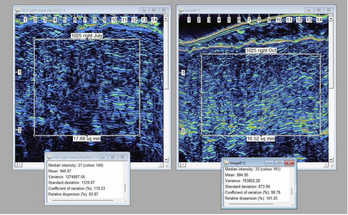Epigenetic Mechanisms Activated by GHK-Cu Increase Skin Collagen Density

Although GHK-Cu was discovered in 1973, it was only recently that biomedical technology advanced to the point where the epigenetic modulation caused by it could be identified.
Epigenetic mechanisms activated by GHK-Cu may increase skin collagen density, new research suggests.
The naturally occurring peptide GHK-Cu (GHK from glycyl-L-histidyl-L-lysine bound to a copper ion), which affects 31.2% of the human genes by either activating or deactivating them (based on a criterion of a reduction or increment in gene activity of more than 50%), meaning that it works by inducing epigenetic alterations in the cells.
The study conducted by Wayne Carey, MD, Professor of Dermatology at McGill University in Canada evaluated 21 subjects utilizing this formulation for 3 months, using pre and post ultra-high resolution ultrasound imaging of the facial skin. There was an average of 28% increase in subdermal echogenic density (which correlates with collagen/elastin elements). The top quartile of participants demonstrated an average of 51% improvement in collagen over 3 months, the study showed.
Although GHK-Cu was discovered in 1973, it was only recently that biomedical technology advanced to the point where the epigenetic modulation caused by it could be identified. After the sequencing of the human genome, in the early 2000s, the Broad Institute launched in 2010 the Connectivity Map, where numerous compounds were analyzed to find out what was their influence on the expression of genes. It was then that became evident the effect that GHK-Cu had on changing the human cellular phenotype by resetting the cells to a younger and healthier state.
Yuvan Research Inc. has developed a novel formulation with pharmaceutical grade excipients that appears to have overcome this hurdle. The company’s novel formulation of GHK-Cu (patent protected) provides greater stability to the compound and facilitates its transdermal delivery. The GHK-Cu-based gel used by Yuvan Research in the clinical trial is called "Neel" (www.Neelgel.com), which means "powerful blue" in Sanskrit, because of its natural blue color.
The discoverer of GHK-Cu, Dr. Loren Pickart, has previously highlighted system wide tissue repairs and physiologic improvements in skin, lung, liver, boney structures, and connective tissues in his research papers. Additionally, the peptide was also found to possess powerful cell-protective actions, such as anti-cancer activities and anti-inflammatory actions mediated through improved fibroblast activity and suppression of damaging inflammatory molecule production. Improved DNA repair and improved proteasome function are also other mechanisms of action.
PHOTO CAPTION: HIGH-RESOLUTION DERMAL ULTRASOUND SCAN OF ONE OF THE CLINICAL TRIAL VOLUNTEERS COMPARING THE INITIAL SKIN TO 3 MONTHS OF THE GHK-CU GEL USE. THE BRIGHTER THE IMAGE, THE HIGHER THE COLLAGEN DENSITY.

Facebook Comments